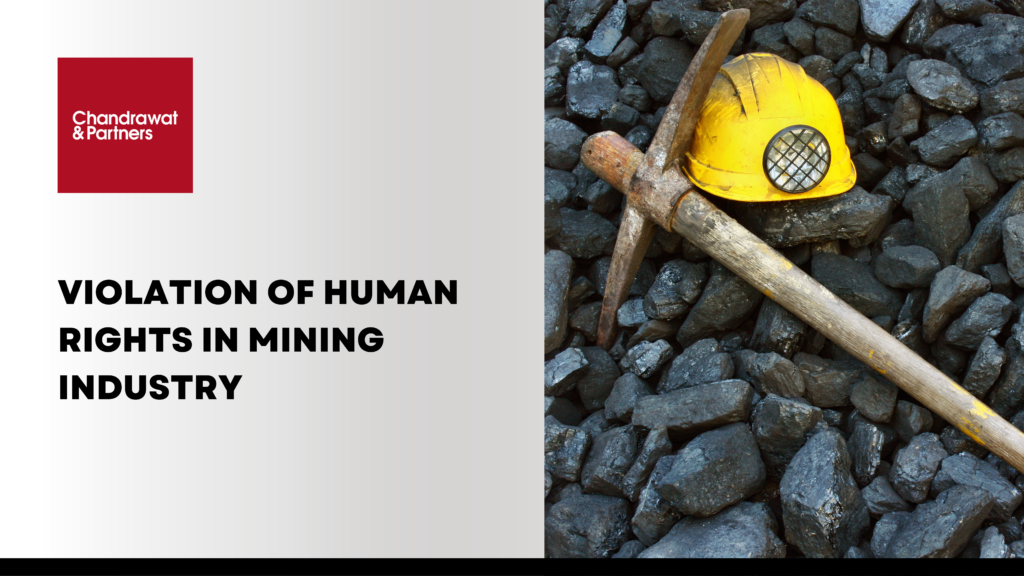Human Rights Violations in the Mining Industry
The violations of human rights in the mining sector are widespread. There is no doubt that this industry is pivotal for the growth of the economy; it has a long history of harming communities. From hazardous working circumstances to ecological corruption and the removal of native networks, the business faces various difficulties that require pressing consideration.
Child Labour
Mining poses significant risks to children in various aspects. One of the primary drivers compelling children to engage in this industry is the pervasive issue of poverty and a lack of necessities.
About one million children work in mines, and the number is increasing.
The physical hazards associated with mining operations include the handling of large and cumbersome weights, strenuous labor, unstable subterranean structures, the use of heavy tools and equipment, exposure to toxic and often explosive chemicals, as well as fluctuations in temperature and humidity. Moreover, mining operations are often situated in remote locations, lacking access to essential social services, law enforcement, and educational resources. In such environments, where familial and community support may be deficient, and the cyclic nature of “boom or bust” circumstances fosters a climate conducive to substance abuse and involvement in activities such as prostitution, mining becomes morally and psychologically perilous.
Environment Degradation
These operations cause significant damage to nature, such as water pollution, air pollution, and deforestation, and this has a strong negative impact on the people working in the mines and also on the communities living in and around the mining area. It also leads to the degradation of land, because of which the locals are not able to grow crops and raise their livestock.
There have been many documented instances of environmental contamination from mining operations in the record; most of them are brought on by tailings leaks. The materials left over after the commercially useful portion of the material has been removed are known as mining tailings. Since tailings are frequently radioactive, poisonous, or acidic, these materials are frequently held in enormous tailings dams to prevent environmental damage. Pollution from mining has significantly decreased as a result of stringent international rules, but it is still an issue in many developing nations where unlawful small-scale operations known as “artisanal mining” take place.
Safety Issues
There are numerous safety-related problems in the mining sector. Every day, miners all around the world face possible risks at work, ranging from occupational illness concerns to the possibility of serious injury or even death.
Workers routinely come into contact with potentially dangerous compounds, such as polymeric chemicals. Workers in enclosed subterranean spaces are regularly subjected to airborne contaminants such as silica, asbestos, and diesel exhaust. It is known that these chemicals can cause cancer in the bladder, lungs, and other bodily regions. Individuals who have come into contact with silica dust run the risk of developing kidney illness, silicosis (which causes lung stiffness and scarring), and lung cancer.
An essential component of mining is the use of explosives. For labourers to remove natural resources from the earth, they are used to blast tunnels and holes in the ground. Even though mining companies must have procedures in place for the safe handling and storage of explosives, mishaps do occur, and the workers are severely injured and die due to this.
Solutions and Way Forward
There are several solutions that, if implemented, will be able to safeguard human rights.
To safeguard human rights in the mining sector, governments must enact and uphold stricter national and international laws and regulations.
Organizations that violate human rights must be held responsible. This entails demanding that they carry out due diligence, uphold human rights in all of their business dealings, and offer compensation for any harm they may cause.
It is important to assist local communities in their fight to protect their rights and make mining firms accountable.
It’s also important to bring attention to the violations of human rights that occur in the mining sector to the public at large, as this may aid in exerting pressure on businesses and governments to act.
How can we help?
Our seasoned team specializes in labor and mining law.
Our team is adept at handling litigations and offers practical guidance to assist clients in navigating the complex legal terrain within the dynamic global business environment.
For more information or queries, please email us at
[email protected]





